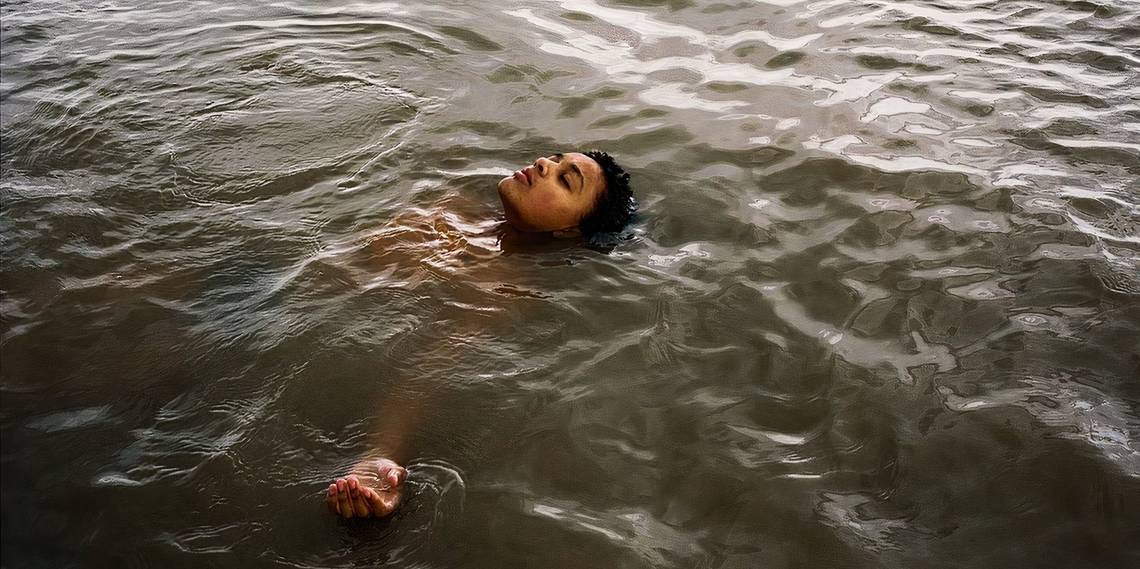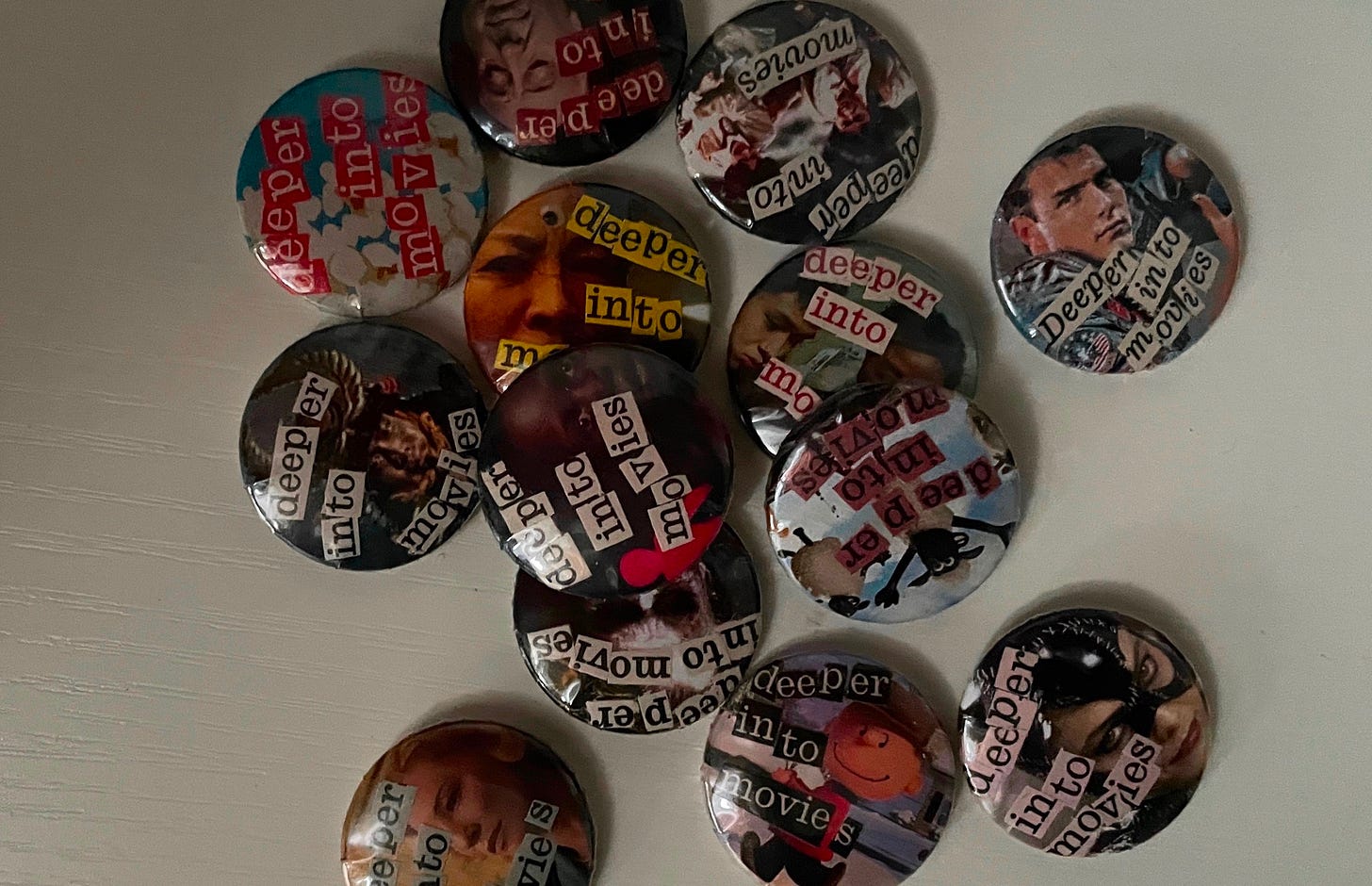First: I’m giving away some fragrance samples of a CUSTO M Deeper Into Movies perfume. Enter to win here.
In November, I put together my ballot of the best movies of the year for Film Comment. Coincidentally, I made this list of twenty just as I watched my one hundredth1 movie released in 2024.2 There is still more to come in 2024, and while I rearranged my middle ten a few dozen times, this feels mostly representative of what I have liked so far. Letterboxd list for the sluts.
Deeper’s Twenty-Ish Favorite Films (So Far) of 2024
Hard Truths, Mike Leigh
I Saw the TV Glow, Jane Schoenbrun
Problemista, Julio Torres
A Real Pain, Jesse Eisenberg
Good One, India Donaldson
Bird, Andrea Arnold
The Beast, Bertrand Bonello
Caught by the Tides, Jia Zhangke
The Shrouds, David Cronenberg
Nickel Boys, RaMell Ross
Small Things Like These, Tim Mielants
My First Film, Zia Anger
Humanist Vampire Seeking Consenting Suicidal Person, Ariane Louis-Seize
Misericordia, Alain Guiraudie
Anora, Sean Baker
Challengers, Luca Guadagnino
Oh, Canada, Paul Schrader
La Chimera, Alice Rohrwacher
Dune: Part Two, Denis Villeneuve
Trap, M. Night Shyamalan
Ineligible due to no wide release:
No Other Land, Basel Adra, Hamdan Ballal, Yuval Abraham and Rachel Szor
You Don’t Have To Go Home, But…, Aidan M. Un
Bonus picks for a good time:
Rumours, Guy Maddin, Evan Johnson, Galen Johnson
Universal Language, Matthew Rankin
Kneecap, Rich Peppiatt
Eephus, Carson Lund
The top ten highest grossing films of 2024 might have been sequels but don’t let that color your opinion. Wade past the multiplex and you’ll find plenty of cinema to admire this year. Here is what I loved about film in 2024.
Nasty Protagonists
Is it a coincidence that three of my top five feature an impossibly difficult lead? Pansy (Marianne Jean-Baptiste, Hard Truths), Elizabeth (Tilda Swinton, Problemista), and Benji (Kieran Culkin, A Real Pain) are just as loathsome as they are appealing: characters who grow but do not fundamentally change. There’s no world where these people start being nice, and this truth is not presented as cynical misanthropy but as evidence of the value of humanity at its thorniest. We see the genuine anguish these characters are experiencing and the pain they inflict, the comedy they wield and the tragedy they cause. Their anger is recognizable to us — and maybe painfully familiar at times — even when it doesn’t excuse their behavior. These films look at how we get along with, and why we keep trying to get along with, the people who drive us crazy. They understand that navigating the spikiness of other people is the point of being here.
To quote The Witch, “You’re not good, you’re not bad, you’re just nice.” Amy March will always be more fascinating than Beth (R.I.P.) and Meg. Elizabeth Bennet and Emma Woodhouse are always more interesting than Jane Bennet. Maybe this is why I wasn’t all in on Everything Everywhere All At Once, why I prefer the hard edges of The Favourite to the girl power pastels of Poor Things, why I yawned my way through the wholesome The Personal History of David Copperfield from Veep creator Armando Iannucci, why I await the end of Ted Lasso’s tyrannic reign.
The Banshees of Inisherin3 felt like a rumbling against the obsession with the go-high niceties that have festered since the Trump administration, a reminder of how interesting character can be when a film isn’t obsessed with likability as decreed by an ethics system arranged by online morons.4
Examinations of State Sanctioned Corruption
While I am highly anticipating the results of “Nun of the Year” at the 2024 Deeper Into Movies Awards (watch this space), I would be remiss not to discuss four enormous movies that scratched the surface of the sins of the Catholic church. Small Things Like These, Conclave, The First Omen, and Immaculate (in order of quality) all explore the sanctioned cruelty of the Church, of organized religion, and of large, hierarchical institutions in general. In this final category, you can also place Nickel Boys, RaMell Ross’s adaptation of the Pulitzer-winning Colson Whitehead novel about an abusive reform school inspired by the real life Dozier School.
I think there’s also some room for Kneecap, a raucous tall tale about the West Belfast-born rap trio known for their Irish-language music, radical anti-colonial politics, and general embrace of bad taste. I promise I don’t have IP brain, but there also traces of this disdain for authority in Denis Villeneuve’s Dune sequel, not in Paul Atreides’ organization of the Indigenous Fremen against the evil Harkonnens, but in Chani’s rebuke of Paul as any kind of Chosen One savior — especially as he aligns himself with the existing ruling structure.
One film I’m deliberately excluding is Juror No. 2, Clint Eastwood’s star-studded legal drama that has hit a bunch of best of the year lists. I don’t really buy the popular narrative, which has blossomed in coverage of this film and its suspiciously limited release, that these “types” of movies — slow, adult dramas — “aren’t being made” anymore. They are being made, as my list of mostly slow, adult dramas demonstrates, they’re just being made more cheaply, without the A-List cast and John Grisham source material that used to be the genre’s hallmarks.
Juror No. 2 is both a victim of Eastwood’s fundamentally lazy filmmaking5 and of its own myopia. I’ve seen the film described as a moral dilemma, and I think this is more a symptom of how eager people are to identify with the middle-class, nice-guy character played by (an always sympathetic) Nicholas Hoult. I struggle to see what the ethical dilemma at the heart of Juror No. 2 is if you recognize the humanity of the cartoonishly no-good, but innocent in this case, suspect in the central trial.
By the film’s own presentation of the facts, it is about someone choosing to do the wrong thing because it is more convenient for him. As is typical of Eastwood, there is virtually no moral grayness. In other words, it’s the ultimate Libertarian film, a cynical look at a system it strawmans, where only one man is able to rise above it.
Optimism from Our Auteurs of Despair
Andrea Arnold’s Red Road and Steve McQueen’s Shame are two of the most brutal, unhappy films I have ever seen. These are directors who have excelled in portraying misery and savage poverty (whether or not it’s conveyed through the lean, hungry eyes of Michael Fassbender, who appeared in Arnold’s Fish Tank and McQueen’s Hunger, Shame, and 12 Years A Slave).

And it’s their thorough explorations of the depths of callousness that made their turns towards optimism this year, in Bird and Blitz respectively, feel so impossible. Bird was much more of a success for me than Blitz, which leansA treacly, but both films are candid, bright explorations of childhood, of British multiracial identity, and of self-discovery. At first glance, Barry Keoghan’s Bug feels like he might be similar to the many cruel, unhappy men in the Arnold filmography. But for all of Bug’s entropic selfishness, his character reveals himself to be much like the world of Bird: imperfect but not irreedemable. And in Bailey’s development (a radiant premiere for Nykiya Adams), we see the extraordinary power of grace, growing up, and earned trust.
And while I was disappointed in Blitz, I am interested in McQueen’s decision to look at how childhood wonder survives amongst violence — territory that feels more like Spielberg (favorable) or Taika Waititi (less favorable). Sean Baker’s Anora, though not as extreme a departure from his previous work, similarly reflects a shift away from the relentlessly hard scrabble and towards Romantic fantasy.
At the New York Film Festival, someone told me this was the worst year for movies they can recall. I’m not qualified to agree or disagree, but there are at least twenty-five movies that are worth their space on the projector reel.
I see anarchy in 2024, but not in the sense that cinema this year was chaotic or meaningless. This year’s best films whole-heartedly rejected conventional ideas about social structure while embracing the humane. Because while institutions are false and meaningless, it doesn’t mean that isolation is the answer. Unfortunately, other people are still the best thing we’ve got, whether they’re at a baseball field (Eephus), a high school dark room (I Saw the TV Glow), Philly dance halls (You Don’t Have to Go Home), or a French Canadian support group for the clinically depressed (Humanist Vampire Seeking Consenting Suicidal Person). Life cannot be streamed. Delete your food delivery apps. Go to the movie theater.
Thank you for reading another year of Deeper Into Movies. See you in 2025.
This is based on Slant Magazine’s list of what got a wide release US release in 2024
The total number of movies I saw in 2024 is P R I V A T E
Green Book’s Best Picture Oscar win in 2018 is pretty egregious but the other films in the line-up — Black Panther (sorry but be for real), Bohemian Rhapsody — are pretty damning
I am hoping the Nightbitch trailer will mean the “messy, glamorous woman” trope will get out of the moving pictures and be relegated to increasingly bad albums from T***** Swift and K*** Perry
As sympathetic as I am to a man who would rather snack than work, you sometimes need to do more than one take









Thanks for this list of stuff to check out. I saw shockingly few new 2024 releases (considering I've watched almost 150 movies so far this year and it's not even officially "the holiday break" yet - I work in academia), so I will be happy to reference this in the coming weeks. I love your pithy and straightforward reviews.
First getting this off my chest: Trap>>>>>>>>>>>Dune part two.
I appreciate your shout out to Kneecap. I had heard about the film (and Kneecap as well) earlier this year, and your take on it has made me really want to see it. I also definitely want to check out The Beast as well (I'm quite fond of Lea Seydoux!). Also Humanist Vampire Seeking Consenting Suicidal Person, partially out of obligation of being Canadian (but not French Canadian, for the record).
Your point about "reject(ing) conventional ideas about social structure while embracing the humane" is beautifully put. By coincidence, the day before I read this piece I had finish watching Michelangelo Antonioni's 1970 film Zabriskie Point. I quite liked it and one of the reasons why is because I feel it embodies this idea perfectly. There's this real sense of tenderness in the film that makes its themes and ideas resonate.
I really want to hear your in depth thoughts on Nosferatu! (I assume your astute comment on Hoult "playing cucks and losers" is at least partly referring to his role in the film. Wonder if he'll bring that energy to his portrayal of Lex Luthor). Rewatching both the 1922 original and Herzog's remake, plus finally seeing Shadow of the Vampire for the first time, have made me incredibly excited to see Eggers incarnation.
What did you think of Lily-Rose Depp's performance? Crucially, how do you rate it on a scale from 1 to 10? 10 being "best nepo baby in the bizz", 1 being "Eggers should've waited until Anya Taylor-Joy was available/cast Olivia Cooke instead" (or Mia Goth, but at least she's in Guillermo Del Toro's upcoming Frankenstein film).